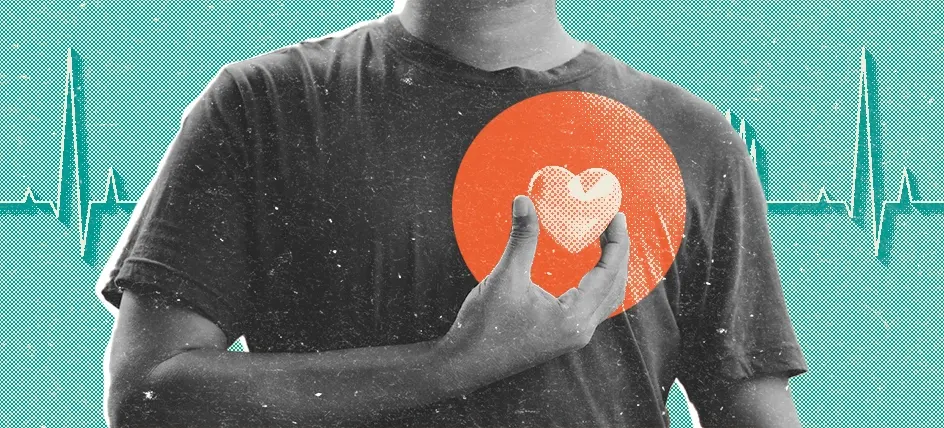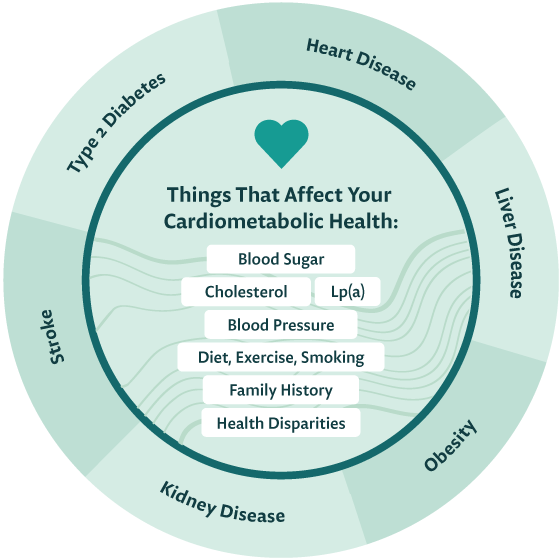Back to Health Resources
What is Cardiometabolic Health?

Cardiometabolic health refers to the overall well-being of your cardiovascular system (your heart and blood vessels) and metabolic system (how your body breaks down food to create energy). Maintaining good cardiometabolic health is vital for a longer, healthier life.
Understanding Cardiometabolic Health
Here’s the bigger picture: obesity, type 2 diabetes, chronic kidney disease, and heart disease are all connected. Doctors know that having one of these conditions greatly increases your chances of getting another. This is because these diseases share common risk factors — health conditions influenced by your lifestyle, your age, and your family history.
Rather than focusing only on the heart, doctors are looking at managing the common risk factors like your blood pressure, your blood sugar, your cholesterol, as well as lifestyle choices and genetic factors that could be contributing to your overall cardiometabolic health (the health of your heart, blood vessels, and metabolic system).
By staying up to date on the latest findings in medical science and managing your risk factors, you may be able to avoid certain diseases and live a longer, healthier life.
Health-Related Behaviors
Smoking
Smoking is a major risk factor for heart disease and other cardiovascular problems. Chemicals in cigarette smoke cause your blood vessels to narrow which can lead to atherosclerosis (hardening of the arteries), coronary heart disease (disease of the heart arteries), stroke, and peripheral arterial disease (bad circulation in the legs). According to the Centers for Disease Control and Prevention (CDC), smokers who quit can significantly reduce the risk of disease and death from cardiovascular disease.1
Diet
A healthy diet can reduce the risk of heart disease, stroke, and type 2 diabetes.2 The DASH diet which stands for Dietary Approaches to Stop Hypertension, is a flexible and balanced plan recommended by the National Heart Lung and Blood Institute. In studies, the DASH diet proved to be effective at lowering blood pressure, cholesterol, obesity, and the risk for developing type 2 diabetes and heart disease.3
Exercise
Being active can help you live longer and lower your risk of heart disease, type 2 diabetes, obesity, and even some cancers. Adults who get at least 150 minutes of moderate physical activity per week can lower their risk of heart disease and stroke. Those who don’t get this recommended amount of exercise but who do increase their physical activity, can start to see health benefits like lower blood pressure, lower triglycerides, and lower blood sugar.4 Check out the CDC recommendations on physical activities here.
Alcohol
The question of whether moderate alcohol drinking (on average 1 drink per day for women and 1-2 drinks per day for men) has some health benefits remains a topic of scientific interest and debate.5 On the other hand, doctors agree that there are many risks associated with heavy alcohol use. Excessive drinking can increase the risk of serious health problems including sudden death (for those with cardiovascular disease), cardiomyopathy (heart muscle weakness), stroke, high blood pressure, pancreatitis, and liver disease.6

Other Factors
Family History
The diseases and health conditions which run in your family can play a big role in your cardiometabolic health. You and your family share genes and you are likely to share common behaviors like your food and exercise habits.
If you have a family member with diabetes, you are more likely to develop it too. Heart disease and related conditions like high blood pressure and high cholesterol can also run in families. It is important to tell your doctor about your family health history, especially if your family members have had heart attacks or heart disease at a young age, as this may be a sign of a hereditary condition like high Lp(a) or familial hypercholesterolemia.7
Weight
Taking care of your weight is important for your overall health, especially as you get older. Having obesity, or significant excess weight, puts you at a much higher risk for many conditions and diseases including high blood pressure, high LDL cholesterol, high triglycerides, type 2 diabetes, heart disease, stroke, arthritic problems, and gallbladder disease. Healthy eating, exercise, sleep, and stress reduction all contribute to a healthy weight.8 Learn more about weight management.
Health Disparities
Researchers have found that bad cardiometabolic health is more common among people who are non-white, male, poor, less educated, or older. This may be due to non-medical factors that influence their health.9 While these health disparities can be viewed through the lens of race and ethnicity, they go beyond that to include underserved communities such as the following:10
- Black, Latino, and other persons of color
- Those from religious minorities
- LGBTQ+ persons
- Persons with disabilities
- Those who live in rural areas
- People impacted by poverty or inequality
- Those with language barriers
Age
According to the American Heart Association, our blood vessels lose elasticity as we get older, making us more likely to develop high blood pressure.11 People who are 65 and older are much more likely to have a heart attack, stroke, or develop heart disease.
Biological Sex
Heart disease is the leading cause of death for both men and women, but there are interesting sex-related differences. Men often develop heart disease at a younger age than women. This difference is partly due to female sex hormones, which help maintain the health of blood vessels, at least until they go through menopause.
The area where cholesterol builds up in the body also varies based on your sex. In men, it typically accumulates in major arteries, while in women, it tends to affect smaller blood vessels.
Additionally, the location of body fat varies between the sexes. Women tend to store extra fat around their hips, thighs, and butt, whereas men tend to carry it in their bellies.12
DISCLAIMER
The information provided on Care Access is intended for informational purposes only and should not be considered as a substitute for professional medical advice, diagnosis, or treatment. Always seek the advice of your physician or other qualified healthcare provider with any questions you may have regarding a medical condition. Our products and content are not intended to diagnose, treat, cure, or prevent any disease.